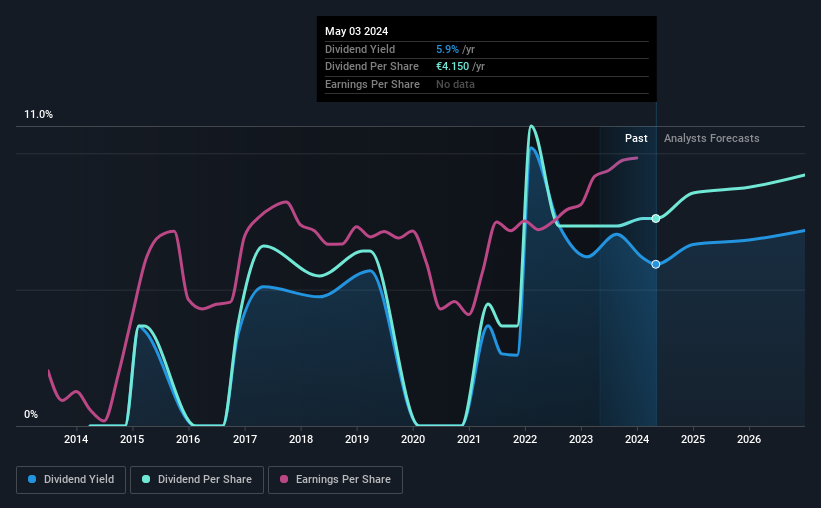KBC Group's (EBR:KBC) Upcoming Dividend Will Be Larger Than Last Year's

KBC Group NV (EBR:KBC) will increase its dividend from last year's comparable payment on the 15th of May to €2.21. This takes the dividend yield to 5.9%, which shareholders will be pleased with.
See our latest analysis for KBC Group
KBC Group's Payment Expected To Have Solid Earnings Coverage
If the payments aren't sustainable, a high yield for a few years won't matter that much.
Having paid out dividends for 9 years, KBC Group has a good history of paying out a part of its earnings to shareholders. Past distributions do not necessarily guarantee future ones, but KBC Group's payout ratio of 52% is a good sign for current shareholders as this means that earnings decently cover dividends.
Looking forward, EPS is forecast to rise by 3.7% over the next 3 years. The future payout ratio could be 61% over that time period, according to analyst estimates, which is a good look for the future of the dividend.

KBC Group's Dividend Has Lacked Consistency
Even in its relatively short history, the company has reduced the dividend at least once. This suggests that the dividend might not be the most reliable. Since 2015, the annual payment back then was €2.00, compared to the most recent full-year payment of €4.15. This works out to be a compound annual growth rate (CAGR) of approximately 8.4% a year over that time. We like to see dividends have grown at a reasonable rate, but with at least one substantial cut in the payments, we're not certain this dividend stock would be ideal for someone intending to live on the income.
KBC Group Could Grow Its Dividend
With a relatively unstable dividend, it's even more important to see if earnings per share is growing. We are encouraged to see that KBC Group has grown earnings per share at 6.7% per year over the past five years. The company is paying a reasonable amount of earnings to shareholders, and is growing earnings at a decent rate so we think it could be a decent dividend stock.
In Summary
Overall, this is a reasonable dividend, and it being raised is an added bonus. The dividend has been at reasonable levels historically, but that hasn't translated into a consistent payment. This looks like it could be a good dividend stock going forward, but we would note that the payout ratio has been at higher levels in the past so it could happen again.
Investors generally tend to favour companies with a consistent, stable dividend policy as opposed to those operating an irregular one. Meanwhile, despite the importance of dividend payments, they are not the only factors our readers should know when assessing a company. For example, we've identified 2 warning signs for KBC Group (1 is potentially serious!) that you should be aware of before investing. Looking for more high-yielding dividend ideas? Try our collection of strong dividend payers.
Valuation is complex, but we're here to simplify it.
Discover if KBC Group might be undervalued or overvalued with our detailed analysis, featuring fair value estimates, potential risks, dividends, insider trades, and its financial condition.
Access Free AnalysisHave feedback on this article? Concerned about the content? Get in touch with us directly. Alternatively, email editorial-team (at) simplywallst.com.
This article by Simply Wall St is general in nature. We provide commentary based on historical data and analyst forecasts only using an unbiased methodology and our articles are not intended to be financial advice. It does not constitute a recommendation to buy or sell any stock, and does not take account of your objectives, or your financial situation. We aim to bring you long-term focused analysis driven by fundamental data. Note that our analysis may not factor in the latest price-sensitive company announcements or qualitative material. Simply Wall St has no position in any stocks mentioned.
About ENXTBR:KBC
KBC Group
Provides banking, insurance, and asset management services primarily for retail, private banking, small and medium sized enterprises, and mid-cap clients in Belgium, Bulgaria, the Czech Republic, Hungary, and Slovakia.
Adequate balance sheet average dividend payer.
Similar Companies
Market Insights
Community Narratives


